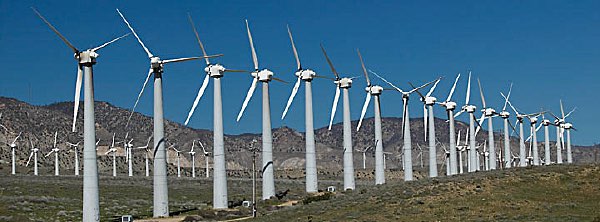- By Dan Veaner
- News
 Print
Print 
The Lansing Town Planning Board tweaked a draft of a proposed Solar and Wind law Monday, preparing it for a final draft to be enacted into law by the Town Board. The Planning Board focused on three issues: security fencing, allowing large scale commercial wind farms, and he amount of contiguous prime soil farmland that should be allowed for large solar arrays. Lansing Director of Planning C.J. Randall said the intent of the law is largely to support green-energy producing installations while still protecting prime farmland and topsoil.
Planning Board members haggled over the height of fencing they think should be required, weighing the pros and cos of 6 foot tall fences vs. 8 feet tall. They seemed to settle on 8 feet, partly because it is harder to climb over, and partly to conform with the Town's existing cell tower law. They also debated whether fencing the entire solar array should be required, vs. just fencing infrastructure.
"We're anticipating a system that is several hundred acres in size. To fence the entirety of that project could be be impracticable," Randall said. "This would allow the Planning Board to require fencing they find appropriate, and not require it where they do not see the purpose of that."
"You certainly want to fence the infrastructure. Because there you're starting to get into high voltage. I think fencing should be required," said Planning Board member Dean Shea. "It's a cost of doing business. I certainly don't think it's a playground for anybody to go in there and mess around."
Alternate Planning Board member Thomas Butler asked why the draft law bans large commercial wind farms. Randall said such installations are not practical in Lansing because there isn't enough wind.
"The highest wind speed in the town is about 5.8 meters per second," she said. "The only places that are really viable in all of Tompkins County are the western ridge of the county: Enfield, Newfield, part of Ulysses. There are a couple of our parcels that look good for small and medium scale wind (in Lansing)."
Planning Board member Larry Sharpsteen argued that banning large commercial wind farms is not necessary, because developers are not going to install wind generators if its not financially feasible. But he argued agains making a law against a technology that might improve to the point where it becomes feasible.
"There's the thing - it's not viable with today's technology. Why mention it?" he asked. "Because technology may reach a point where it is viable. Some of the new vertical helix generators are a lot more efficient, and require a lot less wind than the traditional fan turbans. Nobody's going to come in here with a 200 acre wind farm if they can't get the wind to do the dirty work. By the same token, if t=somebody comes up with the technology that can do it, then maybe we should consider it. Why rewrite our law if that (improvement) in technology does happen?"
Randall asked the Planning Board to look at the four conditions defining where solar arrays may not be located, with special attention to the provision that currently bans them on ten or more contiguous acres of actively-farmed agricultural soils. She explained that the amount of allowed acreage is much too low for the kinds of solar farms she anticipates locating in Lansing, and said she is meeting with county planners later in the week to sound them out on the subject. She said the Town can allow a much higher number of acres, but the county '239' comment portion of Town site plan reviews might force the Planning Board to allow larger solar farms only with a super-majority of member votes.
"While I have heard from this board previously that, perhaps they are not as concerned about county stipulations, especially with regard to land use you need a super-majority to override county recommendations," she said. "I believe that some of these conditions, in particular condition 'i' (which limits the amount of acreage) will likely discourage any significant solar development here."
Randall said the Ag Committee hasn't weighed in on an acreage limit, but added that she has been told that solar projects that are looking to site in Lansing are thinking about 80 to 100 megawatt projects. She said such projects would be approximately 500 acres in size. She asked the Board to come up with a number that makes sense to them for the Town, or even a recommendation to omit the limitation from the law.
Board members wanted until their next meeting to think about it and to poll members of the Ag committee to get farmers' perspective.
Randall said the draft would be updated and brought back to the Planning Board at their August 26th meeting.
v15i31



